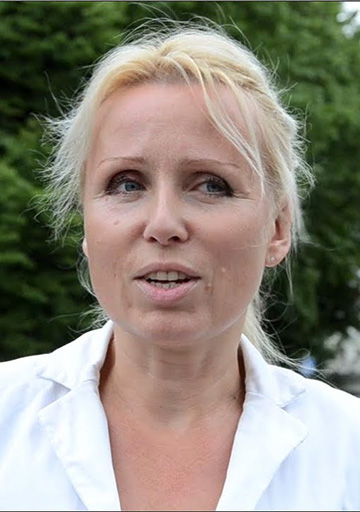|
 UDC 338.45:330.341, JEL L16, L50, O32
UDC 338.45:330.341, JEL L16, L50, O32
Korcelli-Olejniczak, E. K., & Kazmir, L. P. (2021). Tsyfrovizatsiya promyslovykh system: kontseptual'na sutnist' ta klyuchovi chynnyky [Digitalization of industrial systems: conceptual essence and key factors]. Rehional'na ekonomika - Regional Economy, 102 (4), 57-66. DOI: https://doi.org/10.36818/1562-0905-2021-4-7. [in Ukrainian].
Sources: 30
Authors
Korcelli-Olejniczak Ewa KarolinaDoctor of Geography
Professor of the Department of geography of cities and population of the Institute of Geography and Spatial Organization Polish Academy of Sciences
Contacts:  eko@twarda.pan.pl eko@twarda.pan.pl
Webpages:     

Kazmir Lyubomyr PavlovychPh.D. of Economics
Researcher of the Department of problems of the real sector of regions' economy of the Dolishniy Institute of Regional Research of NAS of Ukraine
Contacts:  box5@ukr.net box5@ukr.net
Webpages:        
ResumeThe progress of digital technologies opens new opportunities for economic growth in general and the intensification of industrial production in particular. Issues directly related to the digitalization of industry are now on the agenda of reputable international organizations, national governments, and business representatives, and are at the center of attention of the scientific community. Studies of the phenomenon of industry digitalization are especially important for Ukraine, whose industrial sector has been in decline for a long time. The paper within the framework of a multilevel structural-functional approach highlights the essence, main advantages and problematic aspects of digitalization of industrial systems at local, regional and national levels, as well as highlights the key factors of successful modernization of the processes of design, production and consumption of industrial products under the influence of the involvement of information and digital technologies. The paper argues that the speed and success of the “digital transition” of industrial enterprises depend not only on the existing conditions for accelerated development of technological innovations or the formation of “road maps” of digitalization of certain industries or regions but also on the behavior of companies, their competitors and consumers of their products. The directions of modernization of the management system of industrial development in the conditions of the Ukrainian realities are considered. A matrix structure of program tasks to support the digitalization of the region’s industrial system is proposed. It will allow coordination of the activities of public authorities, local governments, research and educational institutions, businesses and NGOs to support measures for the digitalization of the region’s industrial system, and generate and adsorb relevant innovations. Widespread use of benchmarking methods is proposed for the successful digitalization of industrial systems at the local level.
Keywords:industrial systems, digitalization, Industry 4.0, multilevel structural-functional approach, management levels, regional programs
References- Vyshnevskyy, V. P., & Knyazyev, S. I. (Eds.) (2020). Tsyfrovizatsiya ekonomiky Ukrayiny: transformatsiynyy potentsial [Digitalization of the economy of Ukraine: transformational potential]. Kyiv: Akademperiodyka. [in Ukrainian].
- The Readiness for the Future of Production Report 2018 (2018). World Economic Forum: Website. Retrieved from http://www3.weforum.org/docs/FOP_Readiness_Report_2018.pdf
- Industrial Development Report 2020 (2020). Industrializing in the digital age. UNIDO: Website. Retrieved from https://www.unido.org/sites/default/files/files/2019-12/UNIDO%20IDR20%20main%20 report.pdf
- Boniecki, D., Namysł, W., Krok, W., Iszkowska, J., Borowik, M., Broniatowski, M., & Rabij, M. (2016). Cyfrowa Polska. Szansa na technologiczny skok do globalnej pierwszej ligi gospodarczej [Digital Poland. A chance for a technological leap into the global economic premier league]. McKinsey & Company: Website. Retrieved from https://www.mckinsey.com/pl/our-insights/cyfrowa-polska [in Polish].
- Kontseptsiya rozvytku tsyfrovoyi ekonomiky ta suspil'stva Ukrayiny na 2018-2020 roky [The concept of development of the digital economy and society of Ukraine for 2018-2020] (2018). Approved by the Order of the Cabinet of Ministers of Ukraine dated January 17, 2018, 67-r. Legislation of Ukraine: Website. Retrieved from https://zakon.rada.gov.ua/laws/show/67-2018-r [in Ukrainian].
- Bryukhovetska, N. Yu., & Chernykh, O. V. (2020). Industriya 4.0 ta tsyfrovizatsiya ekonomiky: mozhlyvosti vykorystannya zarubizhnoho dosvidu na promyslovykh pidpryyemstvakh Ukrayiny [Industry 4.0 and digitalization of the economy: opportunities to use foreign experience in industrial enterprises of Ukraine]. Ekonomika promyslovosti – Industrial economics, 2(90), 116-132. DOI: http://doi.org/10.15407/econindustry 2020.02.116 [in Ukrainian].
- Lyakh, A. V., & Svein, A. (2019). Modernizatsiya promyshlennosti na osnove klyuchevykh perspektivnykh tekhnologiy: obzor zarubezhnogo opyta [Industrial modernization based on key promising technologies: a review of foreign experience]. Ekonomika promyslovosti – Industrial economics, 3(87), 34-58. DOI: http://doi.org/10.15407/econindustry2019.03.034 [in Russian].
- Zanizdra, M. Yu. (2017). Perspektivy razvitiya smart-promyshlennosti v Ukraine na baze retsirkulyatsionnoy ekonomiki [Prospects for the development of smart-industry in Ukraine on the basis of a recycling economy]. Hlobal’ni ta natsional’ni problemy ekonomiky – Global and national economic problems, 20, 134-140. [in Russian].
- Mergela, I., Edelmann, N., & Hauga, N. (2019). Defining digital transformation: Results from expert interviews. Government Information Quarterly, 36(4). DOI: https://doi.org/10.1016/j.giq.2019.06.002
- Kazmir, L. P. (2020). Kontseptual’ni aspekty modernizatsiyi systemy upravlinnya rozvytkom promyslovosti v Ukrayini [Conceptual aspects of modernization of industrial development management system in Ukraine]. Rehional’na ekonomika – Regional economy, 4, 115-124. DOI: https://doi.org/10.36818/1562-0905-2020-4-14 [in Ukrainian].
- Vyshnevskyy, V. P. (Ed.) (2018). Smart-promyslovist’ v epokhu tsyfrovoyi ekonomiky: perspektyvy, napryamy i mekhanizmy rozvytku [Smart industry in the era of digital economy: prospects, directions and mechanisms of development]. Kyiv: Institute of Industrial Economics NAS of Ukraine. [in Ukrainian].
- Sidenko, V. R. (2021). Vyklyky i ryzyky tsyfrovoyi transformatsiyi: svitovyy ta ukrayins’kyy konteksty [Challenges and risks of digital transformation: global and Ukrainian contexts]. Ekonomika Ukrayiny – Economy of Ukraine, 5, 40-58. DOI: https://doi.org/10.15407/economyukr.2021.05.040Sidenko [in Ukrainian].
- Tarasovych, V. M. (2021). Teoretychnyy vymir informatsiyno-tsyfrovoyi ekonomiky: osnovy ta systema pervynnykh informatsiynykh fenomeniv [Theoretical dimension of information-digital economy: bases and system of primary information phenomena]. Ekonomika Ukrayiny – Economy of Ukraine, 1, 3-23. DOI: https://doi.org/10.15407/economyukr.2021.01.003 [in Ukrainian].
- Zakharchenko, V. I. (2004). Transformatsiyni protsesy u promyslovykh terytorial’nykh systemakh Ukrayiny [Transformation processes in industrial territorial systems of Ukraine]. Vinnytsya: Hipanis. [in Ukrainian].
- Lund, S., Manyika, J., Woetzel, J., Bughin, J., Krishnan, M., Seong, J., & Muir, M. Globalization in transition: the future of trade and value chains. Executive Summary (2019). McKinsey & Company: Website. Retrieved from https://www.mckinsey.com/featured-insights/innovation-and-growth/globalization-in-transition-the-future-of-trade-and-value-chains
- Soldak, M. O. (2019). Promyslovi ekosystemy i tekhnolohichnyy rozvytok [Industrial ecosystems and technological development]. Ekonomika promyslovosti – Industrial economics, 4(88), 75-91. DOI: http://doi.org/10.15407/econindustry 2019.04.075 [in Ukrainian].
- Landscape Industry 4.0 in Ukraine. Analytical review of innovators and the state of innovation in Ukraine in the field of Industry 4.0 (2019). Kyiv. Retrieved from https://mautic.appau.org.ua/asset/83:landscape-industry-4-0-in-ukraine [in Ukrainian].
- Pidorycheva, I. Yu. (2020). Innovatsiyna ekosystema v suchasnykh ekonomichnykh doslidzhennyakh [Innovative ecosystem in modern economic research]. Ekonomika promyslovosti – Industrial economics, 2(90), 54-92. DOI: http://doi.org/10.15407/econindustry2020.02.054 [in Ukrainian].
- Pyshchulina, O. (Ed.) (2020). Tsyfrova ekonomika: trendy, ryzyky ta sotsial’ni determinanty [Digital economy: trends, risks and social determinants]. Kyiv: Testament. [in Ukrainian].
- Voynarenko, M. P. (2019). Tendentsiyi i perspektyvy rozvytku potentsialu rehional’nykh klasteriv za umov tsyfrovizatsiyi suspil'stva [Trends and prospects for the development of the potential of regional clusters in terms of digitalization of society]. Rehional’na ekonomika – Regional economy, 4, 28-35. DOI: https://doi.org/10.36818/1562-0905-2019-4-2 [in Ukrainian].
- Davymuka, S. A., & Fedulova, L. I. (2018). Tsyfrova transformatsiya rehioniv Ukrayiny [Digital transformation of the regions of Ukraine]. Rehional’na ekonomika – Regional economy, 4, 110-121. [in Ukrainian].
- Тhe Global Risks Report 2020 (in partnership with Marsh & MacLennan and Zurich Insurance Group) (2020). World Economic Forum: Website. Retrieved from http://www3.weforum.org/docs/WEF_Global_Risk_Report_2020.pdf
- Bryukhovetska, N. Yu., & Chorna, O. A. (2019). Intelektualizatsiya yak priorytetnyy napryam rozvytku promyslovykh pidpryyemstv v umovakh Industriyi 4.0 [Intellectualization as a priority direction of industrial enterprises development in the conditions of Industry 4.0]. Ekonomika promyslovosti – Industrial economics, 4(88), 28-57. DOI: http://doi.org/10.15407/econindustry2019.04.028 [in Ukrainian].
- Lozic, J. (2019). Core concept of business transformation: from business digitization to business digital transformation. In Economic and Social Development: Book of proceedings: (pp. 159-167).
- Gregory, P. R., & Stuart, R. C. (1998). Comparative economic systems. Boston: Houghton Mifflin.
- Danylyshyn, B. M., Koretskyy, M. Kh., & Datsiy, O. I. (2007). Makroekonomichne rehulyuvannya investytsiynykh protsesiv [Macroeconomic regulation of investment processes]. Nizhyn: Aspect-Polygraph. [in Ukrainian].
- Myronova, T. L., Dobrovolska, O. P., Protsay, A. F., & Kolodiy, S. Yu. (2006). Upravlinnya rozvytkom rehionu [Management of regional development]: Textbook. Kyiv: Center for Education Literature. [in Ukrainian].
- Gupta, S. (2018). Driving Digital Strategy. A Guide to Reimagining Your Business. Cambridge, MA: Harvard Business Review Press.
- Kozak, N. (2000). Benchmarking kak instrument povysheniya konkurentosposobnosti kompanii [Benchmarking as a tool to increase the competitiveness of the company]. Rynok kapytala – Capital market, 1-2. [in Russian].
- Kazmir, L. P. (2021). Intelektual’nyy kapital yak chynnyk strukturnoyi transformatsiyi ekonomiky rehionu [Intellectual capital as a factor in the structural transformation of the region’s economy]. In Aktual’ni problemy, priorytetni napryamky ta stratehiyi rozvytku Ukrayiny [Current issues, priority areas and strategies of Ukraine’s development]: Abstracts of the II International scientific-practical online conference (pp. 116-118). Kyiv: ITTA. [in Ukrainian].
|